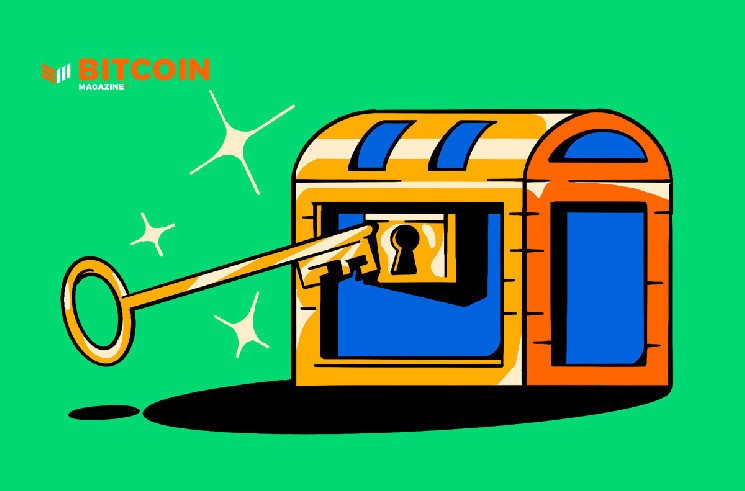Why You Should Consider The Switch To A Non-Custodial Bitcoin Wallet

This is an opinion editorial by Brandon Mintz, the founder and CEO of North American bitcoin ATM network Bitcoin Depot.
A digital wallet is essential to interacting with Bitcoin. In light of recent events within the cryptocurrency industry, it is time to ask yourself what you are doing to protect your digital assets. The current landscape of cryptocurrency provides various options you can use to secure your bitcoin — but one of the simplest ways to do so is by utilizing a non-custodial wallet.
When using a non-custodial wallet, you will have full control over your digital assets.
Custodial Wallets Vs. Non-Custodial Wallets
As you look for a way to store your bitcoin, you will come across two types of wallets: custodial and non-custodial. The most significant difference between these two wallets is that, with a custodial wallet, you are giving control of your bitcoin to a third party, whereas with a non-custodial wallet, you are the one in control.
Custodial Wallets
As the name suggests, a custodial wallet gives custody of the private key associated with a wallet to a third party. Using a custodial wallet is not unlike storing your cash deposits in a commercial bank, in which the assets are your own, but you do not have exclusive control over them. This could create the opportunity for the custodian, or other third parties, to transact with your assets without your authorization.
Many large crypto exchanges operate their businesses using custodial wallets. While you can buy, sell and trade crypto, you are trusting a third party to safeguard your private key and, therefore, your crypto assets.
In certain cases, the asset-holding customer can be treated as an unsecured creditor and, because unsecured debt can be discharged during a bankruptcy, there are instances in which recovery never occurs and the assets are lost. Beyond that, due to the custodial nature of these types of wallets, crypto exchanges have the capability to freeze your wallet holdings and often have the discretion to do so per the terms and conditions agreed to by the wallet user.
Why Use A Custodial Wallet?
With many custodial wallets, you do not have to store your own private keys — all that is required to transact is logging into the wallet with a username and password, and then inputting the public key of the intended recipient. And, if you happen to forget your password, a custodial bitcoin wallet often allows you to reset it.
Drawbacks To Using Custodial Wallets
There are also some disadvantages to using a custodial wallet for your bitcoin. Most custodial wallets require users to agree with their policies and procedures. These can include your assets being frozen or delayed if, for example, withdrawals are paused by the exchange on which you store your bitcoin, which means your bitcoin is not as liquid as you might want it to be. Beyond that, custodial wallets may have a maximum on the value of transactions you may be able to effect in a given period of time.
Most custodial bitcoin wallets are provided by a centralized entity, which means you have to submit to the entity’s know-your-customer (KYC) requirements, including providing personal information to confirm your identity, such as a copy of your driver’s license or your social security number.
Non-Custodial Wallets
By comparison, a non-custodial wallet allows you to keep and manage the private key associated with your wallet. That means you have complete control over and access to the assets held in your non-custodial wallet.
Private keys are used to validate ownership of your assets when a transaction is proposed on the blockchain. Your private key is associated with your public wallet address and is safeguarded by a passphrase only given to you, that consists of 12 or 24 random words.
The tradeoff is that, with a non-custodial wallet, you become responsible for managing and monitoring your wallet holdings and related transactions: the only individual or entity that can protect your assets is yourself. A centralized institution or authority cannot electronically censor or confiscate your assets.
Why Use A Non-Custodial Wallet?
Although they are not without their risks, non-custodial wallets give users complete control over their digital assets. Those holding large amounts of bitcoin might feel more comfortable being solely responsible for overseeing their digital assets.
This level of autonomy and control can mitigate the potential impacts of data breaches, subject to the diligence of and security measures implemented by the wallet user. With the added control also comes the added responsibility for the user to institute proper safety protocols to safeguard assets. Non-custodial wallets also make it easier to send and receive crypto and give you quicker access to your bitcoin assets when you need them.
Another benefit of a non-custodial wallet is that, in the event of lost access to the wallet due to the loss or compromise of a private key, a user can utilize the passphrase associated with the wallet’s private key to recover the wallet’s holdings — either by re-accessing the same wallet or creating a new wallet. Essentially, losing your private key does not mean you have lost permanent access to your bitcoin.
Drawbacks Of Non-Custodial Wallets
There are a few drawbacks to non-custodial wallets. With a non-custodial wallet, you are the one responsible for your private key. You have sole control of your bitcoin, which means greater responsibility on your part. It also means additional precautions should be taken to ensure your private key is kept in a safe, secure place.
While non-custodial wallets can help reduce your chances of losing your assets to hackers, they do require a little more time and effort to set up. Managing bitcoin and safeguarding passphrases may be too much work for users who simply want to store their bitcoin without the hassle of maintaining security over their private keyS.
Which Types Of Wallets Are Non-Custodial?
Non-custodial wallets come in a variety of options. There are hardware wallets, mobile wallets and wallets that you can add as an extension to your web browser. You will find mobile wallets in the Android or iOS app stores, and you can purchase hardware wallets online.
At the time you create your wallet, it should be clear whether the private key is maintained by the provider or not. When you set up your wallet, did it ask you to write down a 12- or 24-word passphrase and keep it in a secure place? If so, your wallet is non-custodial. If this type of request was not made, then there is a good chance you are using a custodial wallet.
This is a guest post by Brandon Mintz. Opinions expressed are entirely their own and do not necessarily reflect those of BTC Inc or Bitcoin Magazine.






 Bitcoin
Bitcoin  Ethereum
Ethereum  Tether
Tether  USDC
USDC  TRON
TRON  Dogecoin
Dogecoin  Cardano
Cardano  Bitcoin Cash
Bitcoin Cash  Chainlink
Chainlink  LEO Token
LEO Token  Monero
Monero  Stellar
Stellar  Zcash
Zcash  Litecoin
Litecoin  Hedera
Hedera  Dai
Dai  Cronos
Cronos  Tether Gold
Tether Gold  OKB
OKB  Ethereum Classic
Ethereum Classic  KuCoin
KuCoin  Gate
Gate  Algorand
Algorand  Cosmos Hub
Cosmos Hub  VeChain
VeChain  Dash
Dash  TrueUSD
TrueUSD  Tezos
Tezos  Stacks
Stacks  IOTA
IOTA  Basic Attention
Basic Attention  Decred
Decred  Theta Network
Theta Network  NEO
NEO  Synthetix
Synthetix  Qtum
Qtum  DigiByte
DigiByte  Ravencoin
Ravencoin  0x Protocol
0x Protocol  Zilliqa
Zilliqa  Nano
Nano  Numeraire
Numeraire  Siacoin
Siacoin  Waves
Waves  Ontology
Ontology  BUSD
BUSD  Enjin Coin
Enjin Coin  Status
Status  Pax Dollar
Pax Dollar  Hive
Hive  Lisk
Lisk  Steem
Steem  Huobi
Huobi  NEM
NEM  OMG Network
OMG Network  Bitcoin Gold
Bitcoin Gold  Augur
Augur  Ren
Ren  HUSD
HUSD